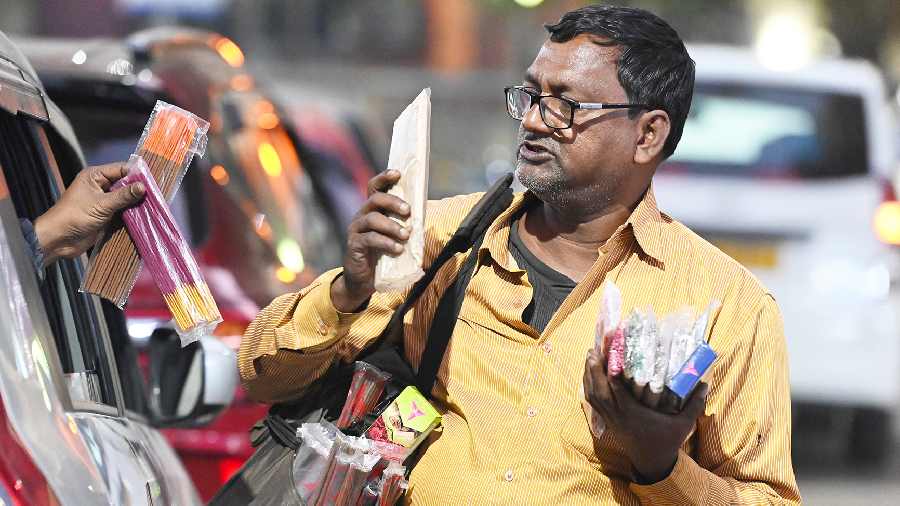Sailen Roy says he cannot think of anything that he has not done for a living.
In the theatre that is Park Street, that is, the street itself and its pavements, some people have a long history. Stall owners, beggars and balloon sellers are familiar faces. Some come and go. Some have joined not so long ago. Roy, 53, belongs to the last group.
He is also an artiste.
The front of Oxford Bookstore is a mini auditorium. Here you have a young man playing the flute and selling it. Against the rush of party people in their winter sleekness and a whiff of perfume, a tune that he plays rises and takes you somewhere else. Into the middle of it, Roy bursts in.
“These are the best,” he says, shaking a bunch of sandalwood incense sticks in your face. “Buy them and see. If you want any other kind, just tell me,” he says. In the same breath, he offers an ayurvedic treatment for fatty liver, a particular tree bark that he can procure, and also winter’s special jaggery, Nolen Gur, and Joynagarer Moa, a delicacy made with Nolen Gur, directly from Joynagar, in South 24-Parganas district.
“There is nothing that I have not tried,” he says again. Three days later, I get 500 grams of the best Joynagarer Moa. “I am also delivering a 5kg rooster to someone,” he says.
He is supported by an invisible network of everything, reminding one of a character in Satyajit Ray’s Jana Aranya talking about how some have access to everything, from “aalpin (pins) to elephant”.
A stocky, bespectacled man who does not tire of speaking, Roy was born and brought up in a Behala Sakher Bazar neighbourhood, where he lived with his parents and siblings. He studied till Class X in Baidyapara High School. A property dispute left him with no choice but to look for work from early.
“I worked at a hawker’s stall in Gariahat. I was supplying materials nearby when Manmohan Singh was to visit Golpark once,” says Roy. During the pandemic, he started to sell masks in the Park Street area. Now he sells incense sticks (dhoop), starting work at 7am and finishing in the evening. He lives somewhere in Behala, he says.
He is barefoot. “I gave up wearing shoes in 1984. One day I woke up in the morning and decided to give up shoes. I have gone everywhere without shoes, from Chennai to Darjeeling,” he says. “Before giving up shoes, I had a pair of North Stars,” he adds, without any self-pity.
“But you don’t know the real thing about me. Ami abritti kori (I recite poetry),” he says. Rabindranath Tagore, Nazrul Islam and Sukanta Bhattacharya are his favourite poets, he says. He is drawn towards long narrative or declaratory poems, which require a certain dramatic rendition, and also towards deep pathos and tragedy.
“I hardly recite poems now, because very few people are interested in listening, says Roy. “But if you are interested, I will recite some for you.”
Bengal boasted of a culture of poetry recitation once. Recitation, or abritti, was performed as much on public stages, by star reciters or lesser artistes, as at homes, where the smaller children were often required, on parents’ demands, to recite poetry for guests. The children would also be lined up and made to perform on neighbourhood stages, which could result in martyr-like expressions on their faces.
Roy comes from this tradition. “I won many awards at poetry competitions,” he informs. His style of rendition, however, has nothing tentative about it; if rather dramatic, it is an impassioned outpouring of grief and anger, even an outburst.
He first recites Tagore’s long narrative poem Debatar grash (What the deity devoured), all of its 200-odd lines. This is about a child who is snatched from his mother’s breast and thrown to the savage waters, as their boat is headed towards Gangasagar, the pilgrimage. The rising waves were demanding the sacrifice of the child, it had been decided. The child’s cry “Mashi, mashi…”, for his aunt, the person he loved the most, is drawn out dramatically for effect by Roy and it is strange to hear the words rise above the frantic Park Street New Year din.
“But the next one is really my poem. It explains my situation precisely,” says Roy. “I will recite ‘Amar kaifiyat (My explanation)’ by Nazrul,” he says. “Khudhatoor shishu chaye na swaraj, chaye duto bhaat, ektu noon… (The famished does not want Swaraj, it wants a bowl of rice, a bit of salt…)”.
“What was true of politicians during the freedom struggle is true of them still,” says Roy. He spits out the last lines. “Prarthana koro jarakere khaye tetrish koti mukhergrash, jeno lekha hoy amar rajya-lekhaye tader sarbanash (Pray that my words, written in blood, may spell doom for those who are grabbing food away from the mouths of our 33 crore people).”
He goes on to recite two more Nazrul poems: Kulimajoor (Labourer) and Bidrohi (Rebel). “I also like Tagore’spoem ‘Prashna’,” says Roy. This poem is another deep questioning of the role of authority. “But I prefer Nazrul to Tagore,” says Roy.
Why? “Tagore is Tagore, above everyone else. But there is something about Nazrul that I can’t quite put into words,” says Roy, and with his hand gestures towards the grey, winter afternoon sky hanging over Park Street.
